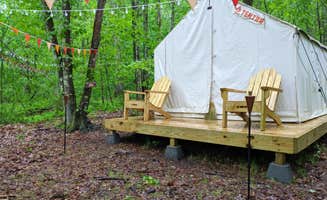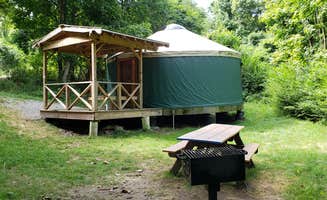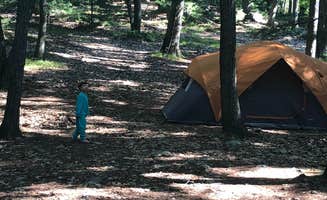Tent camping near Blackstone, Massachusetts centers primarily around state parks and management areas within a 30-mile radius. The region experiences seasonal variation with summer temperatures typically ranging from 65-85°F and winter dropping to 20-35°F. Most campgrounds in this area remain open from May through October, with several offering primitive sites requiring campers to carry in supplies.
What to do
Water activities at Arcadia Management Area: Rhode Island's largest recreational area contains multiple camping areas with primitive facilities. One camper visiting Frosty Hollow Camping Area noted its convenient access to fishing spots: "The nearby brooks and ponds offer great trout fishing in spring, just remember to get your Rhode Island fishing license first."
Hiking opportunities: Many campgrounds provide direct trail access. At Federated Womens Club State Forest, trails lead to historical sites. "If you continue past site 15, you'll head through Gate 36 out toward Soapstone Hill which offers a great view of Quabbin Reservoir and sunsets," explains a camper who explored the area.
Historical exploration: The Boston Harbor Islands State Park Campground offers unique historical structures to explore. "Exploring the island was awesome. We found all kinds of bunkers and a brick house," reports a visitor who camped at Lovells Island.
What campers like
Island camping experience: Visitors appreciate the isolation despite proximity to urban areas. "This island is beautiful and has an old fort to explore as well as a lot of Rocky shoreline and trails. You can build bon fires and see gorgeous sunsets," writes one camper about Peddocks Island.
Natural surroundings: Campers value the wooded settings. A visitor to Buck Hill Campground shared: "The area is heavily wooded without much else around and very few amenities... The water is clean and fine for swimming with a few areas that make for easy entry into the water."
Diverse terrain options: The variety of camping environments ranges from wooded to waterfront. At Waters Edge Campground in Coventry, campers can choose from sites along the water or nestled in the woods, offering flexibility for different preferences.
What you should know
Ferry logistics: For Boston Harbor Islands, transportation requires advance planning. "Getting to the island was a bit of a hassle. We live in Boston and took all of our gear on the T to the harbor by the aquarium. We then took the ferry to Georges Island. After that we waited and got on a much smaller island to Lovells."
Seasonal operations: Most campgrounds close during winter months. Camp Nihan Education Center typically operates only during warmer months, and some facilities have been affected by temporary closures. "I can't wait til the current renovation is done so we can go there again soon," noted one visitor.
Limited amenities: Many campsites are primitive with minimal facilities. "Bring your own water. There is a composting toilet located near the group site in the field," advises a camper about Federated Womens Club State Forest.
Tips for camping with families
Child-friendly options: Some sites offer specific advantages for families with young children. One parent shared about Camp Nihan: "The group site is super close to parking and yet the terrain is rugged enough that it always felt like we were really in the woods. A recently renovated bathroom and shower facility makes clean ups easy."
Educational opportunities: Several campgrounds have nature programming. "This campground is only open during the summer months," notes a camper about Boston Harbor Islands, where "you can take small ferries to a variety of other islands to go swimming or explore. This is a great adventure for kids."
Swimming areas: Multiple campgrounds feature swimming opportunities suitable for children. "The camp is also adjacent to Breakheart Reservation, which had a great shallow pond with life guard on duty as well as bike trails and a range of different hikes," reports a visitor to Camp Nihan.
Tips from RVers
Limited RV access: Most primitive campgrounds in this region don't accommodate RVs. Sites that do allow RVs often have restrictions on size and hookups, so calling ahead to check accessibility is essential.
Off-grid preparation: RVers should come prepared for limited or no hookups. Boston Harbor Islands and several other primitive camping areas in the region don't provide electrical or water hookups for recreational vehicles.
Alternative accommodations: Consider yurts for a more comfortable camping experience. "The yurts on Peddocks are great, providing shelter from the elements, bunks with mattresses, electricity, a ceiling fan, table with benches, and a grill," notes one visitor who stayed at Boston Harbor Islands.




